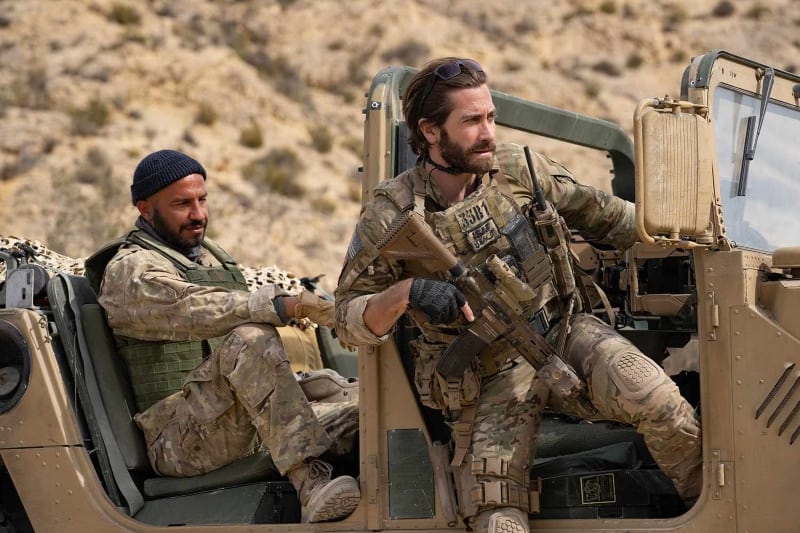Guy Ritchie has made numerous films across a few different genres, but the phrase “a Guy Ritchie movie” will most likely bring a specific kind of movie to mind — one involving amateur criminals, cockney accents, needle drops, creative insults, and rapid-fire violence. It’s perhaps odd, then, that his fourteenth film as director is the first to officially namecheck the filmmaker right at the title. Guy Ritchie’s The Covenant almost never feels like a Ritchie film, but at least now it won’t be mistaken for the half dozen or so other movies with the same/similar title.
U.S. Army Sergeant John Kinley (Jake Gyllenhaal) is one of many American soldiers tasked with missions in Afghanistan as part of an arguably unwinnable war against the Taliban. His squad, like most others in the country, include Afghan locals who’ve been vetted and are working as interpreters for the Americans. Ahmed (Dar Salim) has a wife and newborn, and while it’s dangerous work, his end goal is the safety of starting a new life back in the United States. When an ambush leaves Kinley severely wounded behind enemy lines, it’s Ahmed who risks his own life on a heroic journey back to a U.S. base. When the American sergeant awakes back home several weeks later, though, he discovers that Ahmed and his family never made it out of Afghanistan.
Guy Ritchie’s The Covenant — from this point forward, simply The Covenant — offers up a straightforward, well-acted tale of honor against a backdrop of war and politics. While not based directly on a true story, it feels every bit inspired by the realities of the situation as thousands of Afghan interpreters were left to find their own fates against the Taliban after the American withdrawal. Here the focus is dialed down to just two men, each of whom save the other’s life in dramatic fashion.
Ritchie, who also co-wrote the script (along with Ivan Atkinson and Marn Davies), splits the film into two halves. The first builds to Ahmed’s act of determined heroism, a duty he could very easily have walked away from that puts him in imminent danger more than once. It’s the back half that’s more compelling, though, as Kinley finds himself engaged with a heavy debt. The covenant of the title is the unspoken contract the soldier feels he signed while mostly unconscious to the world — this man saved his life and returned him home to his wife and children, and while he wishes he could ignore the pull, he knows he owes Ahmed the same.
Kinley’s mental and emotional struggle is a fascinating take on an otherwise familiar motivation, and Gyllenhaal gives that internal fight real weight. You believe that Kinley would wash his hands of it all if he could only convince himself that was an option, and as his frustrations with the system grow he finds the determination that his only recourse is direct action. Ritchie doesn’t lay on the family drama any thicker than need be, there’s no big fight between Kinley and his wife (Emily Beecham) — everyone involved understands instinctually and innately that returning to Afghanistan to find and help Ahmed is the only choice there is. Salim is equally good and finds ways to communicate his internal feelings beyond simply voicing them. The film doesn’t delve quite as deep into his character’s motivations, but the surface-level needs are evident.
While The Covenant never quite reaches the levels of The Killing Fields by way of Cannon Films, there’s still enough action here to satisfy war junkies looking for tactical set-pieces and the carnage that flows from heavy weaponry. Ritchie and cinematographer Ed Wild capture the immediate, frenetic nature of modern-day battles as mines, bullets, and gunships tear apart the landscape and anything on it. There’s an energy that builds with each exchange, an impact you can feel as bullets find contact, and there’s a degree of suspense even if we trust our protagonists will survive to see another day. Ritchie is no stranger to action sequences, but here there’s not even a whiff of the silliness or style he’s best known for from the likes of Snatch (2000) or Sherlock Holmes (2009).
What ultimately holds The Covenant back is a lack of ambition towards anything more than a competently told tale of bloodshed and honor. That’s not quite a knock — far too many films can’t even achieve that level of competency — but it strands the film in the land of good, well-made films you’ll most likely never watch (or think of) again. Complaints against Ritchie’s early deference towards style over substance have mostly faded, and films like this should continue to prove that the label is no longer applicable.

